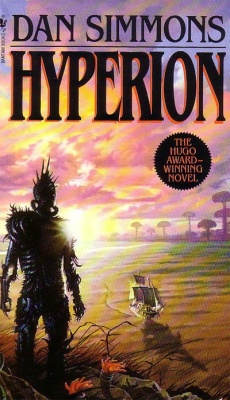With the galaxy on the brink of civil war, a bureaucrat, a
soldier, a shaman, a priest, a poet, a scholar, and a detective make a last perilous
pilgrimage to the distant planet Hyperion where a mythical deity called The
Shrike may hold the answers to all their questions. During the voyage, they
take turns sharing their stories and revealing their motivations for
undertaking such a dangerous quest.
Dan Simmons’ 1989 Hugo Award-winning novel has both the
trappings of stock science fiction and the literary bonafides to easily
transcend it. The futuristic setting of Hyperion is home to the requisite
robots (both androids and more humanistic “cybrids”), rebels (the mysterious
Ousters), empire (the Hegemony of Man), technology upgrades (interstellar “farcasting”)
and more. And while the omnipresent jargon can be a bit much, Hyperion can also
lay claim to an impressive amount of breadth and depth.
To start, both the narrative and the characters are
intricately crafted. The pilgrimage serves as a frame story as each traveler
has his or her tale revealed. The backstories, without exception, are rife with
personal tragedies (the priest discovers the horrible fate of his mentor, the
scholar’s daughter ages backwards and loses her memory, etc.) but are still
distinct enough to maintain some elements of surprise. Moreover, each story’s narrative
voice is well-suited to the character. The poet’s tale, for instance, is both
cultured and decadent while the detective’s basks in Chandleresque noir.
In addition, Simmons has clearly done his homework. The novel
is structured like The Canterbury Tales,
but it shares a title with a poem by John Keats that tells the story of the
fallen Greek Titans (with clear parallels to the book’s plot), and the poet
himself turns up reincarnated in a way (it makes sense in context). There are
also allusions to modern science (faster-than-light travel is enabled by a “Hawking
Drive”), politics (Hyperion’s late king is descended from the House of
Windsor), religion (the emigration from Earth is called the hegira as in Islam’s
hejira) and more. Reading Hyperion is
like examining our cultural legacy through the telescopic lens of the future, a
provocatively fascinating experience.
The book’s biggest drawback is the pacing. For as much as the
backstories can be engrossing, they all contain portions that are eminently skipable.
There is also a lot of build-up to an ending that amounts to the most shamelessly
blatant sequel hook I’ve encountered since the first Lord of the Rings movie.
As a self-contained work, Hyperion
demands patience but rewards it generously. If you can get past the jargon and
make do with a lack of closure, there is a lot that is worth your attention
here.
8.25/10

No comments:
Post a Comment